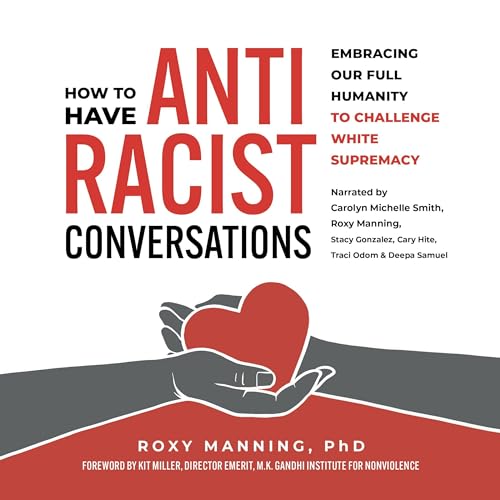How to Have Antiracist Conversations By Roxy Manning

- Narrated by: Carolyn Michelle Smith, Roxy Manning, Stacy Gonzalez, Cary Hite, Traci Odom, Deepa Samuel
- Length: 6 hrs and 33 mins
- Release date: 09-26-23
How to Have Antiracist Conversations By Roxy Manning AudioBook summary
Utilizing Dr. Martin Luther King’s Beloved Community framework, activists will be empowered to create change and equity through fierce yet compassionate dialogue against racism and systematic white supremacy.
Can a person be both fierce and compassionate at once? Directly challenge racist speech or actions without seeking to humiliate the other person? Interrupt hateful or habitual forms of discrimination in new ways that foster deeper change? Dr. Roxy Manning believes it’s possible—and you can learn how.
In this book, Dr. Manning provides a new way to conceive of antiracist conversations, along with the practical tools and frameworks that make them possible. Her work is grounded in the idea of Beloved Community, as articulated by Dr. Martin Luther King, Jr., as a goal to aspire to and even experience now, in the present, when we refuse to give up on the possibility of human connection within ourselves, with potential allies, and with those whose words and actions create harm. This book fuels courage and provides tools to confront everyday forms of racism. It walks the listener through an effective, efficient model of dialogue that utilizes concepts of nonviolent communication and helps normalize talking about racism instead of treating it like a “third rail”, strictly avoided or touched at one’s peril.
Listeners will
- Be empowered to identify what kind of antiracist conversation they want to have—for example, do they only want to be heard, or do they want to negotiate a change in policy?
- Learn how to engage in antiracist conversations whether they are the Actor (person who says or does something racist), the Receiver (the target of racism), or the Bystander.
- Learn how to notice the underlying needs and values that motivate all human actions and how those values can open up pathways to transformation.
Examples of antiracist conversations highlight different ways to initiate dialogue, raise awareness, speak one’s truth, and make clear, doable requests or demands for change.
Download


